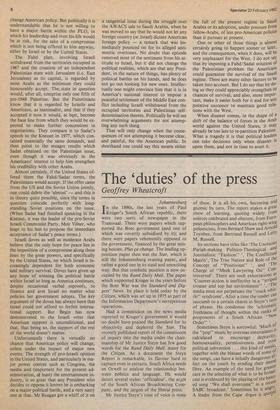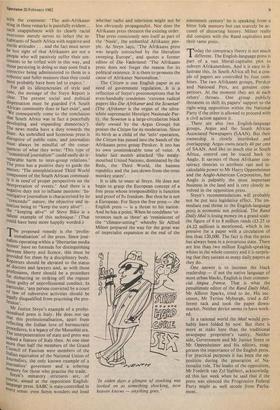The 'duties' of the press
Geoffrey Wheatcroft
Johannesburg
In the 1890s, the last years of Paul Kruger's South African republic, there were two sorts of newspaper in the Transvaal. There were papers which sup- ported the Boer government (and one of which was covertly subsidised by it); and there were papers vehemently opposed to the government, financed by the great min- ing houses. Plus ca change. The leading op- position paper then was the Star, which is still the Johannesburg evening paper, and rather a good one in its staid and unexciting way. But that symbolic position is now oc- cupied by the Rand Daily Mail. The paper which supported Kruger in the years before the Boer War was the Standard and Dig- gers' News. Its place is held today by the Citizen, .which was set up in 1975 as part of the Information Department's surreptitious operations.
Had a commission on the news media reported to Kruger's government it would no doubt have praised the Standard for its objectivity and deplored the Star. The recently published report of the commission of inquiry into the media under the chair- manship of Mr Justice Steyn has few good words for the Rand Daily Mail, many for the Citizen. As a document the Steyn Report is remarkable, its flavour hard to capture even in extracts. South Africa needs an Orwell to analyse the relationship bet- ween politics and language. He would detect several styles: 'officialese', the argot of the South African Broadcasting Com- pany, and the jargon of the liberal press.
Mr Justice Steyn's tone of voice is none of these. It is all his own, hectoring and gnomic by turn. The report makes a great show of learning, quoting widely from sources celebrated and obscure, from Euro- pean philosophers and American right-wing, polemicists, from Bernard Shaw and Arnold Toynbee, from Bertrand Russell and Letty M. Russell.
Its sections have titles like 'The Unctuous Pariah-making Politico-Theological and Journalistic "Fashion" ', The Conflictual Matrix' ,`The True Nature and Role of the Concept of "Positivism" ', and 'The Charge of "Meek Lawyering On" Con- troverted'. There are such exhortations as `Counter-action is ineffective in a "striped trouser and top hat environment" 'The media must not perpetuate the "stuck will's' tle" syndrome'. After a time the reader can succumb to a certain charm in Steyn's turn of phrase. He condemns the 'schismatic, frothiness of thought within the ranks 01 proponents of a South African "New Order" '. Sometimes Steyn is sorrowful: 'Much Of the "pop" music by overseas entertainers is calculated to encourage depravity, homosexuality, permissiveness and even political subversion . . . this kind of music', together with the blatant words of some °,.` the songs, can have a lethally dangerous el; fect on the youth by eroding their niorai fibre. An example of the need for greater care in the selection of what is to be broad- cast is evidenced by the playing of the bane' ed song "We shall overcome" in a recent SABC broadcast.' Sometimes he is angdfj A leader from the Cape Argus is clu°tre with the comment: 'The anti-Afrikaner sting in these remarks is painfully evident... such snappishness with its clearly racial overtones merely serves to infect the in- habitants of South Africa with negative and sterile attitudes . . . and the fact must never be lost sight of that Afrikaners are not a People who will passively suffer their sen- timents to be trifled with in this way, and those persisting in doing so may soon find a corrective being administered to them in a robuster and fuller measure than they could most probably have been led to expect.' For all its idiosyncrasies of style and tone, the message of the Steyn Report is clear. The present social and political dispensation must be guarded ('A South African community does in fact exist', and We consequently come to the conclusion that South Africa was in fact a peacefully developing and expanding democracy'). The news media have a duty towards the State. An unbridled and licentious press is disruptive of public calm, and journalists must always be mindful of the conse- quences of what they write: 'This type of "committed journalism" could easily do ir- reparable harm to inter-group relations.' The press has a positive duty to guide the masses: 'The unsophisticated Third World component of the South African communi- ty is in need of proper perspectives on the interpretation of events.' And there is a negative duty not to inflame passions: 'In- vestigative journalism is characterised by its "crescendo" nature, the objective and in- tention being to "keep the story alive".. . the "keeping alive" of Steve Biko is a salient example of this technique.' (That could have been more happily worded.)
he proposed remedy is the `profes-
sionalisation' of the press. Since jour- nalists operating within a 'libertarian media system' have no formula for distinguishing between liberty and licence, this must be Provided for them by a disciplinary body. Reporters should be elevated to the status of doctors and lawyers and, as with those Professions, there should be a procedure for disbarring or striking off the register those guilty of unprofessional conduct. In Particular, 'any person convicted by a court of law of subversive activities should be legally disqualified from practising the pro- fession', Mr Justice Steyn's example of a profes- sionalised press is Italy. He does not say that this professionalisation, apart from reflecting the Italian love of bureaucratic Procedures, is a legacy of the Mussolini era. ,I he interpenetration of state and press was indeed a feature of Italy then. At one time More than half the members of the Grand Council of Fascism were members of the Italian equivalent of the National Union of Journalists, the only known example of a Journalists' goverment and a sobering memory for those who practise the trade. Steyn's minatory strictures are, of course, aimed at the opposition English- language press. SABC is state-controlled in every sense: even Steyn wonders out loud whether radio and television might not be less obviously propagandist. Nor does the Afrikaans press threaten the existing order. That press consciously sees itself as part of the 'Nasie', the embattled Afrikaner peo- ple. As Steyn says, 'The Afrikaans press was largely untouched by the liberalism sweeping Europe', and quotes a former editor of Die Vaderland: 'The Afrikaans press does not forget the reason for its political existence. It is there to promote the cause of Afrikaner Nationalism.'
The Citizen is one English paper in no need of government regulation. It is a reflection of Steyn's preconceptions that he even-handedly condemns 'extreme radical papers like Die Afrikaner and the Sowetan' (The Afrikaner is the organ of the ultra- white supremacist Herstigte Nasionale Par- ty, the Sowetan is a large-circulation black daily owned by the Argus Group) but praises the Citizen for its moderation. Since its birth as a child of the 'info' operation, the Citizen has passed into the hands of the Afrikaans press group Perskor. It too has its own unmistakeable tone of voice. A leader last month attacked 'the mealy- mouthed United Nations, dominated by the Reds, the Third World, the banana republics and the just-down-from-the-trees monkey states'.
It is idle to sneer at Steyn. He does not begin to grasp the European concept of a free press whose irresponsibility is function and proof of tts freedom. But then he is not a European. For Steyn the free press — the English press — is a threat to his nation. And he has a point. When he conddmns 'ut- terances such as these' as 'reminiscent of the "climate-setting" whereby Sir Alfred Milner prepared the way for the great war of imperialist expansion at the end of the
'In olden days a glimpse of stocking was looked on as something shocking, now heaven knows — anything goes.'
nineteenth century' he is speaking from a bitter folk memory but can scarcely be ac- cused of distorting history. Milner really did conspire with the Rand capitalists and their tame press.
Today the conspiracy theory is not much different. The English-language press is part of a vast liberal-capitalist plot to subvert Afrikanerdorn. And it is easy to il- lustrate this. In South Africa all but a cou- ple of papers are controlled by four com- bines. The two AfrikaanS groups, Perskor and Nasional Pers, are genuine com- petitors. At the moment they are at each others' throats. One group publicly threatens to shift its papers' support to the right-wing opposition .within the National Party if the other is allowed to proceed with a civil action against it.
There are also two English-language groups, Argus and the South African Associated Newspapers (SAAN). But their ownership is closely interlinked and overlapping: Argus owns nearly 40 per cent of SAAN. And like so much else in South Africa, control can be traced back to Anglo. It savours of those Afrikaner con- spiracy theories to attribute vast and in- calculable power to Mr Harry Oppenheimer and the Anglo-American Corporation, but Anglo is palpably the most important business in the land and is very closely in- volved in the opposition press.
Steyn's recommendations will probably not be put into legislative effect. The im- mediate real threat to the English-language press is economic not political. The Rand Daily Mail is losing money on a grand scale: the figure of 6 to 8 million rands (0.25 to £4.32 million) is mentioned, which is im- pressive for a paper with a circulation of less than 120,000. The fact is that the press has always been in a precarious state. There are less than two million English-speaking whites in the whole country and it is surpris- ing that they sustain as many daily papers as they do.
One answer is to increase the black readership — if not the native language of most urban blacks, English is their commer- cial lingua franca. That is what the penultimate editor of the Rand Daily Mail, Mr Allister Sparks, tried to do. His suc- cessor, Mr Tertius Myburgh, tried a dif- ferent tack and took the paper down- market. Neither device seems to have work- ed.
In a rational world the Mail would pro- bably have folded by now., But there is more at stake here than the traditional newspaper proprietor's vanity. Neither side, Government and Mr Justice Steyn or Mr Oppenheimer and his editors, exag- gerates the importance of the English press. For practical purposes it has been the op- position during the generation of Na- tionalist rule. The leader of the opposition, Mr Frederik van Zyl Slabbert, acknowledg- ed this last week when he said that if the press was silenced the Progressive Federal Party might as well secede from Parlia- ment.







































 Previous page
Previous page